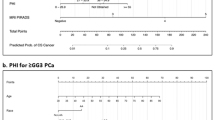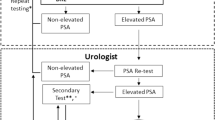Abstract
Backround:
Recently metabolic syndrome has been associated to an increased risk of advanced disease. Aim of our study is to investigate the association of metabolic syndrome (MetS) with the risk of prostate cancer (PCa) upgrading and upstaging after radical prostatectomy (RP).
Methods:
From 2012 and 2016, 400 consecutive men underwent RP at three referral centers in Italy and were enrolled into a prospective database. Blood pressure, body mass index and waist circumference were measured before RP. Blood samples were also collected and tested for total PSA, fasting glucose, triglycerides and HDLs. Logistic regression analyses were used to assess the association between MetS, defined according to Adult Treatment Panel III, and the risk of upgrading and upstaging), using the new Prognostic Grade Group (PGG) classification system.
Results:
Overall 148/400 (37%) men were diagnosed with MetS and most of these reported up-grading (54.5%) and up-staging (56.8%). These events were significantly more common in this population and MetS was a risk factor for up-staging and up-grading on multivariable analysis. Patients with MetS presented worst accuracy (72 vs. 84%; p = 0.001) and worst kappa coefficient of agreement (k = 0.439 ± 0.071 vs. k = 0.553 ± 0.071) between needle biopsy and radical prostatectomy specimens when compared to patients without MetS.
Conclusions:
MetS represents a significant risk factor for upgrading and upstaging. Accuracy of PGG system on biopsy is poor in patients with MetS, therefore results should be evaluated carefully in this population.
This is a preview of subscription content, access via your institution
Access options
Subscribe to this journal
Receive 4 print issues and online access
$259.00 per year
only $64.75 per issue
Buy this article
- Purchase on Springer Link
- Instant access to full article PDF
Prices may be subject to local taxes which are calculated during checkout
Similar content being viewed by others
Change history
01 February 2019
The original version of this Article contained an error in the spelling of the authors Cosimo De Nunzio, Aldo Brassetti, Giuseppe Simone, Riccardo Lombardo, Riccardo Mastroianni, Devis Collura, Giovanni Muto, Michele Gallucci and Andrew Tubaro, which were incorrectly given as De Nunzio Cosimo, Brassetti Aldo, Simone Giuseppe, Lombardo Riccardo, Mastroianni Riccardo, Collura Devis, Muto Giovanni, Gallucci Michele and Tubaro Andrea. This has now been corrected in both the PDF and HTML versions of the Article.
References
Brassetti A, Lombardo R, Emiliozzi P, Cardi A, Antonio DV, Antonio I, et al. Prostate-specific Antigen Density Is a Good Predictor of Upstaging and Upgrading, According to the New Grading System: The Keys We Are Seeking May Be Already in Our Pocket. Urology. 2017;111:129–35.
Bhindi B, Xie WY, Kulkarni GS, Hamilton RJ, Nesbitt M, Finelli A, et al. Influence of Metabolic Syndrome on Prostate Cancer Stage, Grade, and Overall Recurrence Risk in Men Undergoing Radical Prostatectomy. Urology. 2016;93:77–84.
De Nunzio C, Simone G, Brassetti A, Mastroianni R, Collura D, Muto G, et al. Metabolic syndrome is associated with advanced prostate cancer in patients treated with radical retropubic prostatectomy: results from a multicentre prospective study. BMC Cancer. 2016;16:407.
De Nunzio C, Aronson W, Freedland SJ, Giovannucci E, Parsons JK. The correlation between metabolic syndrome and prostatic diseases. Eur Urol. 2012;61:560–70.
Liu F, Wang J, Wu H-L, Wang H, Wang J-X, Zhou R, et al. Leisure time physical activity and risk of prostate cancer: a dose-response meta-analysis. Minerva Urol Nefrol. 2017. https://doi.org/10.23736/S0393-2249.17.02874-0.
Alchin DR, Murphy D, Lawrentschuk N. Risk factors for Gleason Score upgrading following radical prostatectomy. Minerva Urol Nefrol. 2017;69:459–65.
Epstein JI, Zelefsky MJ, Sjoberg DD, Nelson JB, Egevad L, Magi-Galluzzi C, et al. A Contemporary Prostate Cancer Grading System: A Validated Alternative to the Gleason Score. Eur Urol Eur Assoc Urol. 2016;69:428–35.
Mottet N, Bellmunt J, Bolla M, Briers E, Cumberbatch MG, De Santis M, et al. EAU–ESTRO–SIOG Guidelines on Prostate Cancer. Part 1: Screening, Diagnosis, and Local Treatment with Curative Intent. Eur Urol. 2016;71:618–29.
Cholesterol N, Program E. Third Report of the National Cholesterol Education Program (NCEP) Expert Panel on Detection, Evaluation, and Treatment of High Blood Cholesterol in Adults (Adult Treatment Panel III) final report. Circulation. 2002;106:3143–421.
Epstein JI, Allsbrook WC, Amin MB, Egevad LL, ISUP Grading Committee. The 2005 International Society of Urological Pathology (ISUP) Consensus Conference on Gleason Grading of Prostatic Carcinoma. Am J Surg Pathol. 2005;29:1228–42.
Pierorazio PM, Walsh PC, Partin AW, Epstein JI. Prognostic Gleason grade grouping: data based on the modified Gleason scoring system. BJU Int NIH Public Access. 2013;111:753–60.
Jin B-S, Kang S-H, Kim D-Y, Oh H-G, Kim C-I, Moon G-H, et al. Pathological upgrading in prostate cancer patients eligible for active surveillance: Does prostate-specific antigen density matter? Korean J Urol. 2015;56:624–9.
D’Amico AV, Whittington R, Malkowicz SB, Schultz D, Blank K, Broderick GA, et al. Biochemical outcome after radical prostatectomy, external beam radiation therapy, or interstitial radiation therapy for clinically localized prostate cancer. JAMA. 1998;280:969–74.
Corcoran NM, Hong MKH, Casey RG, Hurtado-Coll A, Peters J, Harewood L, et al. Upgrade in Gleason score between prostate biopsies and pathology following radical prostatectomy significantly impacts upon the risk of biochemical recurrence. BJU Int. 2011;108:E202–10.
Kvåle R, Møller B, Wahlqvist R, Fosså SD, Berner A, Busch C, et al. Concordance between Gleason scores of needle biopsies and radical prostatectomy specimens: a population-based study. BJU Int. 2009;103:1647–54.
Sfoungaristos S, Perimenis P. Clinical and pathological variables that predict changes in tumour grade after radical prostatectomy in patients with prostate cancer. Can Urol Assoc J. 2013;7:E93–7.
Epstein JI, Feng Z, Trock BJ, Pierorazio PM. Upgrading and Downgrading of Prostate Cancer from Biopsy to Radical Prostatectomy: Incidence and Predictive Factors Using the Modified Gleason Grading System and Factoring in Tertiary Grades. Eur Urol. 2012;61:1019–24.
D’Elia C, Cerruto MA, Cioffi A, Novella G, Cavalleri S, Artibani W. Upgrading and upstaging in prostate cancer: From prostate biopsy to radical prostatectomy. Mol Clin Oncol. 2014;2:1145–9.
Yiakoumos T, Kalble T, Rausch S. Prostate-specific antigen density as a parameter for the prediction of positive lymph nodes at radical prostatectomy. Urol Ann. 2015;7:433.
Nowroozi MR, Momeni SA, Ohadian Moghadam S, Ayati E, Mortazavi A, Arfae S, et al. Prostate-Specific Antigen Density and Gleason Score Predict Adverse Pathologic Features in Patients with Clinically Localized Prostate Cancer. Nephrourol Mon Kowsar Med Inst. 2016;8:e39984.
Moreira Leite KR, Camara-Lopes LHA, Dall’Oglio MF, Cury J, Antunes AA, Sañudo A, et al. Upgrading the Gleason score in extended prostate biopsy: implications for treatment choice. Int J Radiat Oncol Biol Phys. 2009;73:353–6.
Freedland SJ, Wieder Ja, Jack GS, Dorey F, deKernion JB, Aronson WJ. Improved risk stratification for biochemical recurrence after radical prostatectomy using a novel risk group system based on prostate specific antigen density and biopsy Gleason score. J Urol. 2002;168:110–5.
Moussa AS, Li J, Soriano M, Klein EA, Dong F, Jones JS. Prostate biopsy clinical and pathological variables that predict significant grading changes in patients with intermediate and high grade prostate cancer. BJU Int. 2009;103:43–8.
Leyh-Bannurah S-R, Dell’Oglio P, Tian Z, Schiffmann J, Shariat SF, Suardi N, et al. A proposal of a new nomogram for predicting upstaging in contemporary D’Amico low-risk prostate cancer patients. World J Urol. 2017;35:189–97.
Kheterpal E, Sammon JD, Diaz M, Bhandari A, Trinh Q-D, Pokala N, et al. Effect of metabolic syndrome on pathologic features of prostate cancer. Urol Oncol Semin Orig Investig Elsevier. 2013;31:1054–9.
De Nunzio C, Freedland SJ, Miano R, Trucchi A, Cantiani A, Carluccini A, et al. Metabolic syndrome is associated with high grade gleason score when prostate cancer is diagnosed on biopsy. Prostate. 2011;71:1492–8.
Kayali M, Balci M, Aslan Y, Bilgin O, Guzel O, Tuncel A, et al. The relationship between prostate cancer and presence of metabolic syndrome and late-onset hypogonadism. Urology. 2014;84:1448–52.
Sfanos KS, De Marzo AM. Prostate cancer and inflammation: the evidence. Histopathology. 2012;60:199–215.
De Marzo AM, Platz Ea, Sutcliffe S, Xu J, Grönberg H, Drake CG, et al. Inflammation in prostate carcinogenesis. Nat Rev Cancer. 2007;7:256–69.
De Nunzio C, Presicce F, Tubaro A. Inflammatory mediators in the development and progression of benign prostatic hyperplasia. Nat Rev Urol. 2016;13:613–26.
Gandaglia G, Karnes RJ, Sivaraman A, Moschini M, Fossati N, Zaffuto E, et al. 4 prostate cancers created equal? Implications for the applicability of the novel grade grouping. Urol Oncol Semin Orig Investig. 2017;35:461.e7–e14.
Sourbeer KN, Howard LE, Andriole GL, Moreira DM, Castro-Santamaria R, Freedland SJ, et al. Metabolic syndrome-like components and prostate cancer risk: results from the Reduction by Dutasteride of Prostate Cancer Events (REDUCE) study. BJU Int. 2015;115:736–43.
De Nunzio C, Lombardo R, Gacci M, Nacchia A, Presicce F, Alkhatatbeh H, Serni S, Tubaro A. Metabolic Syndrome Does Not Increase the Risk of Ejaculatory Dysfunction in Patients With Lower Urinary Tract Symptoms and Benign Prostatic Enlargement: An Italian Single-center Cohort Study. Urology. 2017; 105:85-90.
Wallner LP, Morgenstern H, McGree ME, Jacobson DJ, St Sauver JL, Jacobsen SJ, et al. The effects of metabolic conditions on prostate cancer incidence over 15 years of follow-up: results from the Olmsted County Study. BJU Int. 2011;107:929–35.
De Nunzio C, Presicce F, Lombardo R, Cancrini F, Petta S, Trucchi A, et al. Physical activity as a risk factor for prostate cancer diagnosis: a prospective biopsy cohort analysis. BJU Int. 2016;117:E29–35.
De Nunzio C, Simone G, Brassetti A, Mastroianni R, Collura D, Muto G, et al. Metabolic syndrome is associated with advanced prostate cancer in patients treated with radical retropubic prostatectomy: results from a multicentre prospective study. BMC Cancer. 2016;16:407.
Presti JC, O’Dowd GJ, Miller MC, Mattu R, Veltri RW. Extended peripheral zone biopsy schemes increase cancer detection rates and minimize variance in prostate specific antigen and age related cancer rates: results of a community multi-practice study. J Urol. 2003;169:125–9.
Authors contribution:
DNC conceived and designed the work that led to the submission, acquired data, played an important role in interpreting the results, drafted the manuscript, approved the final version. BA conceived and designed the work that led to the submission, acquired data, played an important role in interpreting the results, drafted the manuscript, approved the final version. SG conceived and designed the work that led to the submission, acquired data, drafted the manuscript, approved the final version. LR conceived and designed the work that led to the submission, acquired data, played an important role in interpreting the results, drafted the manuscript, approved the final version. MR conceived the work that led to the submission, acquired data, revised the manuscript, approved the final version. CD conceived the work that led to the submission, acquired data, revised the manuscript, approved the final version. MG conceived the work that led to the submission, acquired data, revised the manuscript, approved the final version. GM designed the work that led to the submission, acquired data, played an important role in interpreting the results, drafted the manuscript, approved the final version. TA conceived and designed the work that led to the submission, acquired data, played an important role in interpreting the results, drafted the manuscript, approved the final version.
Author information
Authors and Affiliations
Corresponding author
Ethics declarations
Conflict of interest
The authors declare that they have no conflict of interest.
Rights and permissions
About this article
Cite this article
De Nunzio, C., Brassetti, A., Simone, G. et al. Metabolic syndrome increases the risk of upgrading and upstaging in patients with prostate cancer on biopsy: a radical prostatectomy multicenter cohort study. Prostate Cancer Prostatic Dis 21, 438–445 (2018). https://doi.org/10.1038/s41391-018-0054-9
Received:
Revised:
Accepted:
Published:
Issue Date:
DOI: https://doi.org/10.1038/s41391-018-0054-9
This article is cited by
-
Metabolic syndrome and its components predict the biochemical recurrence and adverse pathological features of patients following radical prostatectomy: a propensity score matching study
BMC Cancer (2023)
-
Physical activity decreases the risk of cancer reclassification in patients on active surveillance: a multicenter retrospective study
Prostate Cancer and Prostatic Diseases (2021)
-
No detrimental effect of a positive family history on postoperative upgrading and upstaging in men with low risk and favourable intermediate-risk prostate cancer: implications for active surveillance
World Journal of Urology (2021)
-
Evaluation of serum fatty acid binding protein-4 (FABP-4) as a novel biomarker to predict biopsy outcomes in prostate biopsy naïve patients
International Urology and Nephrology (2020)



